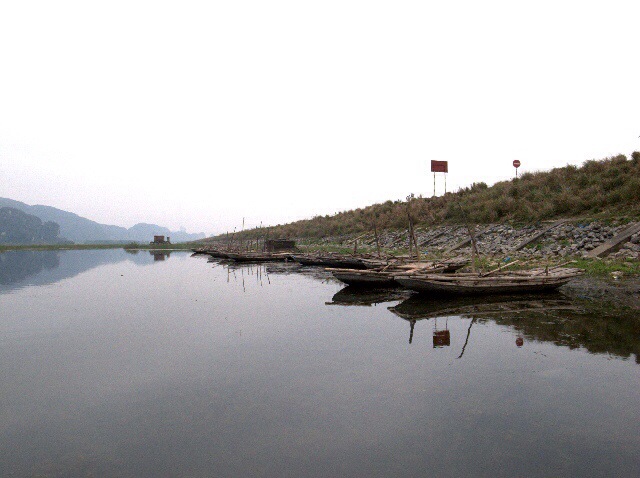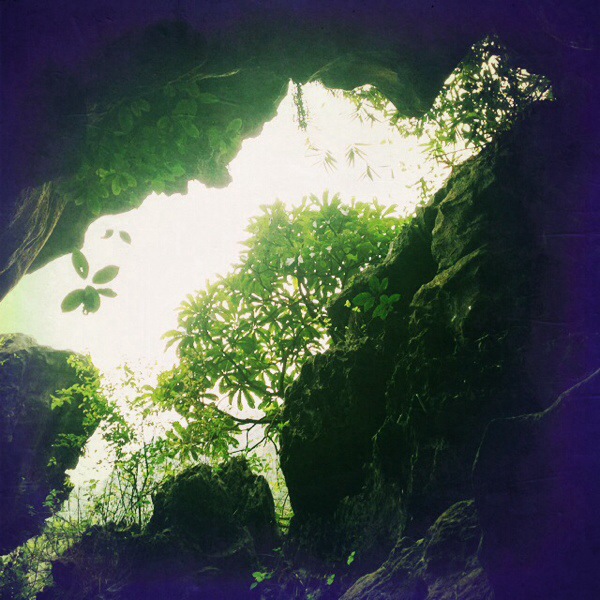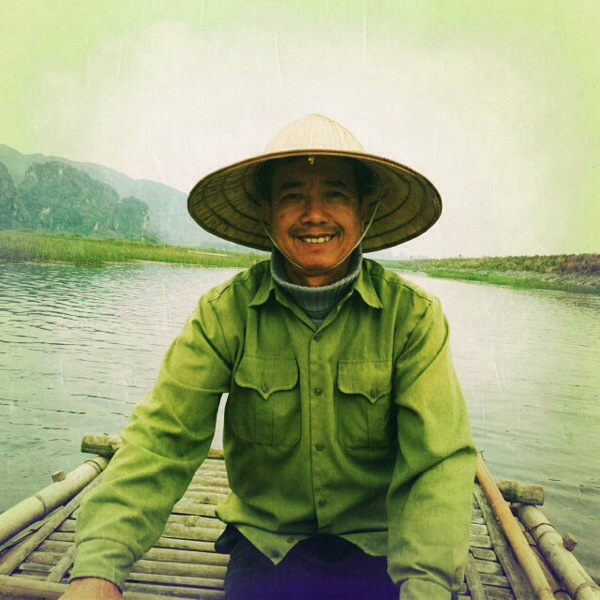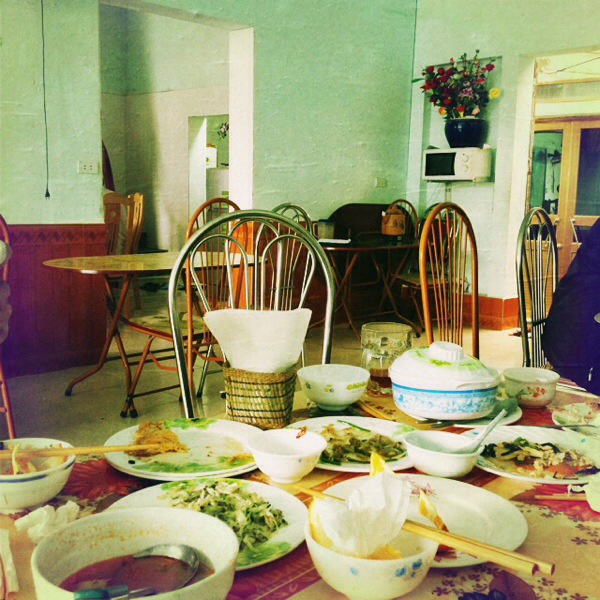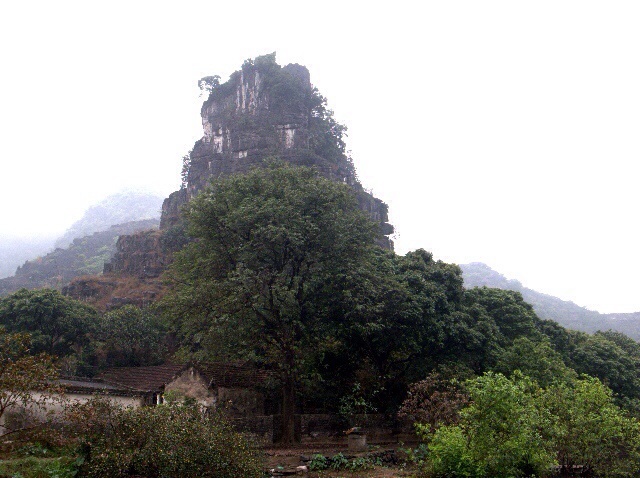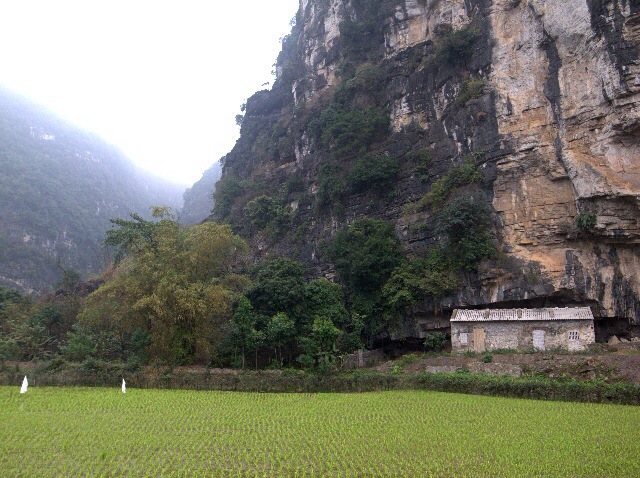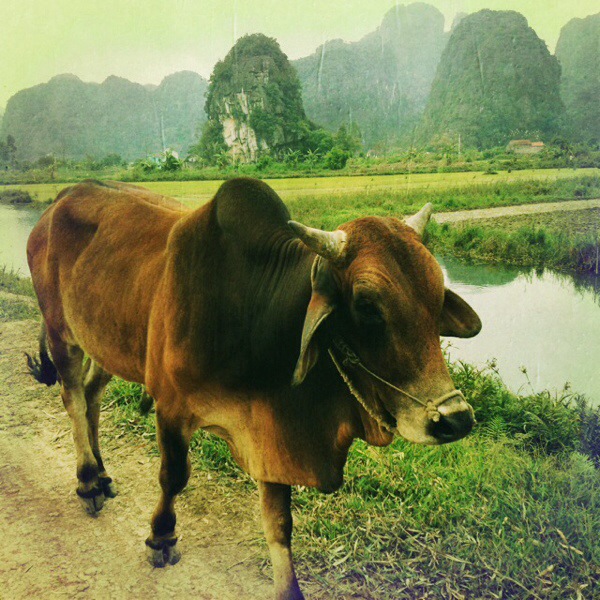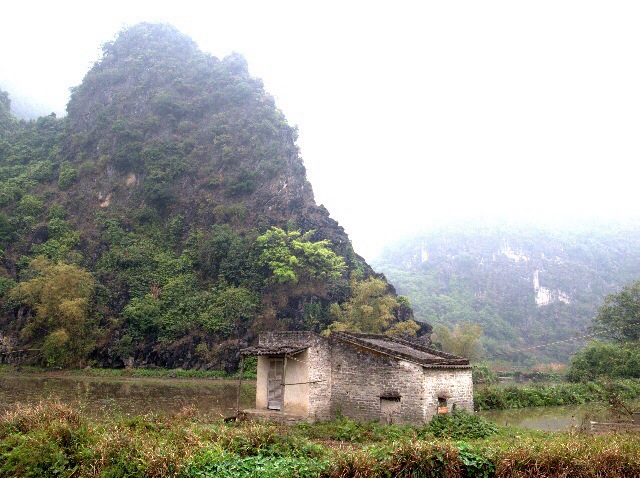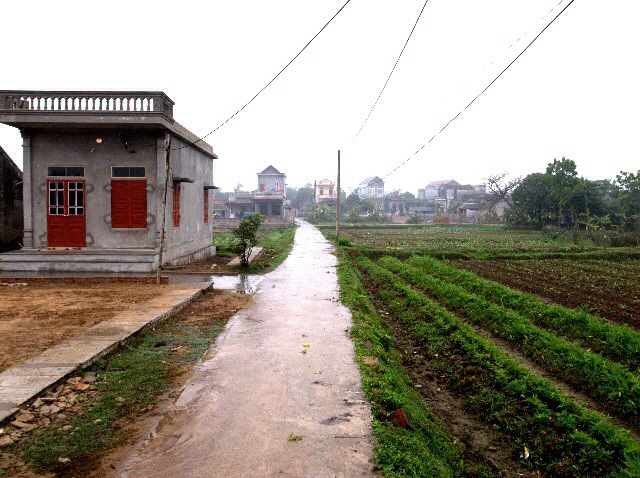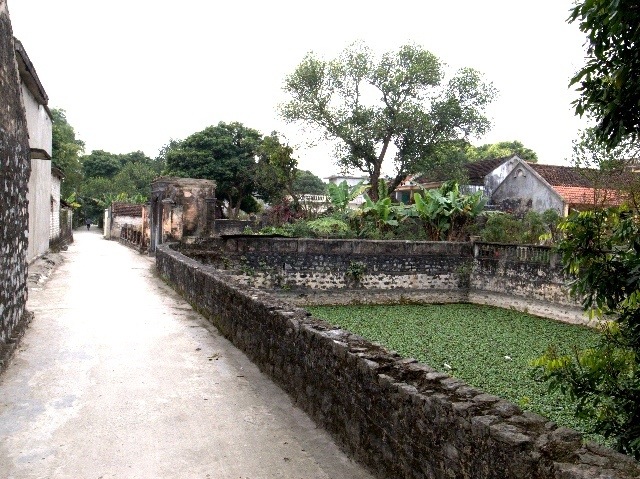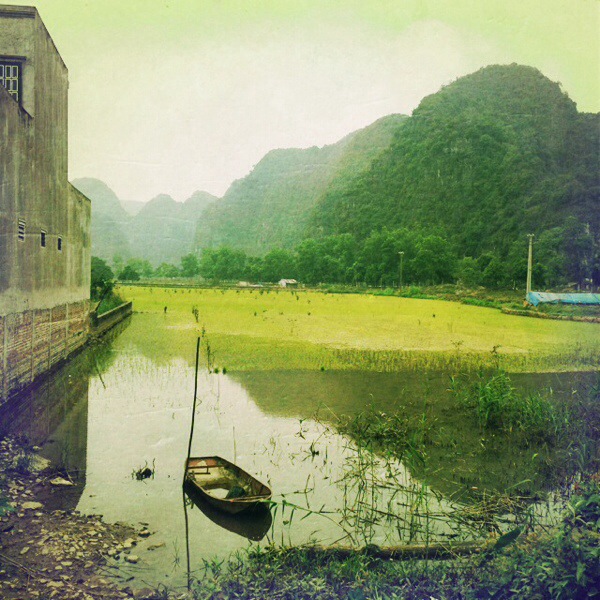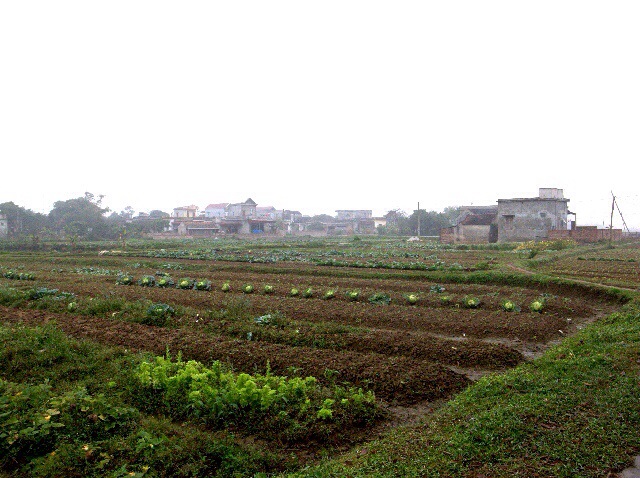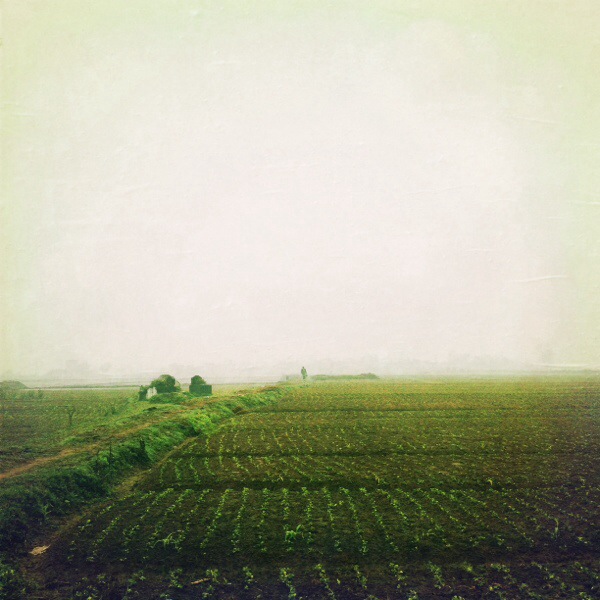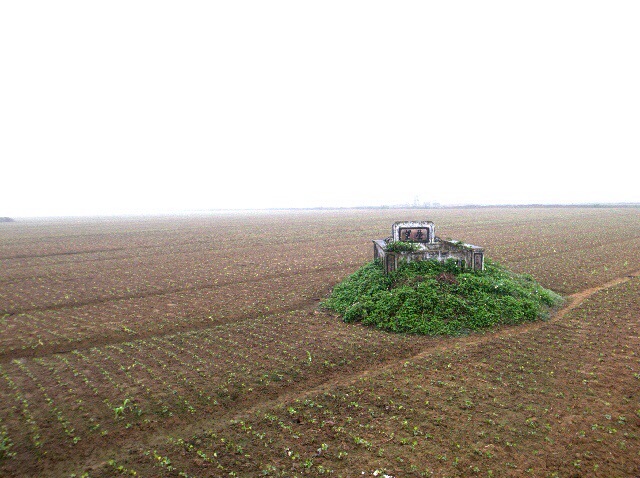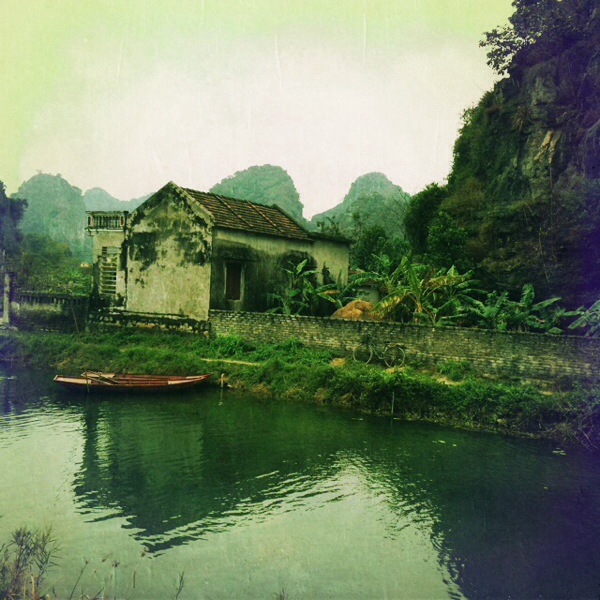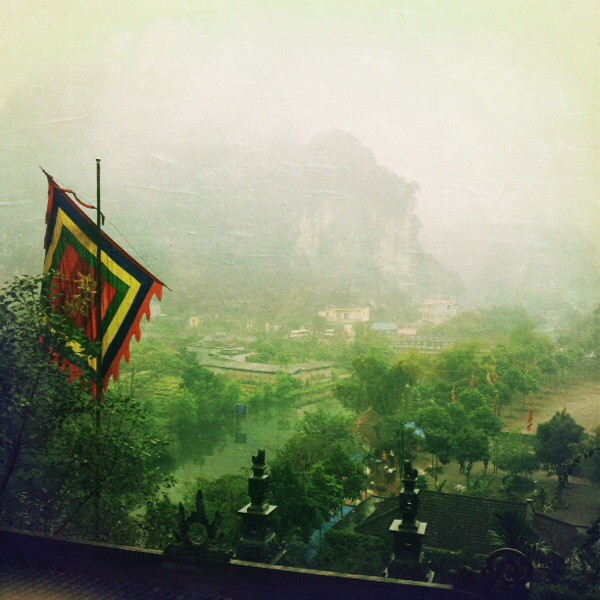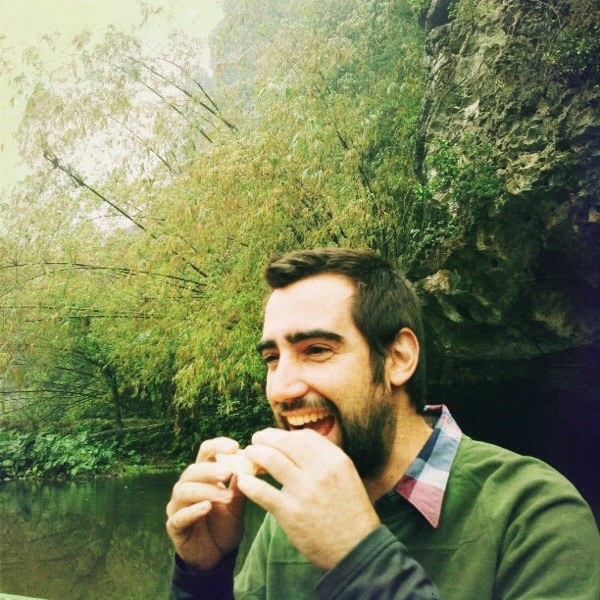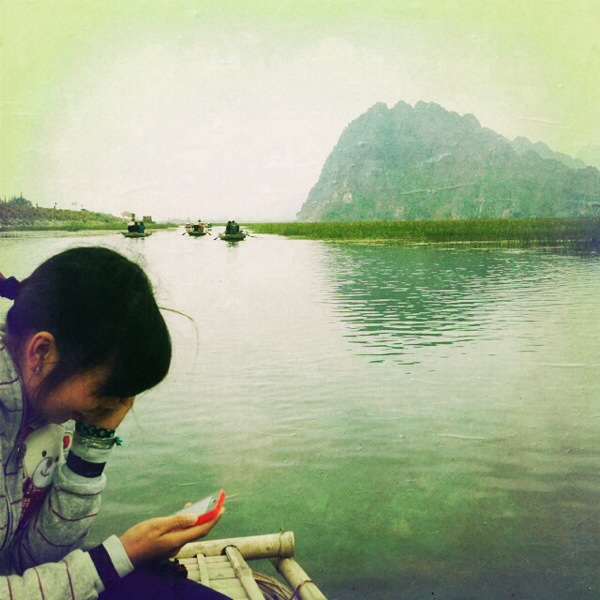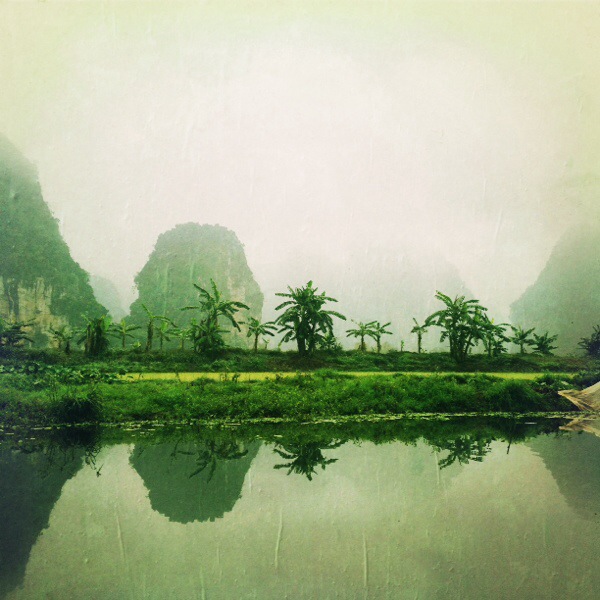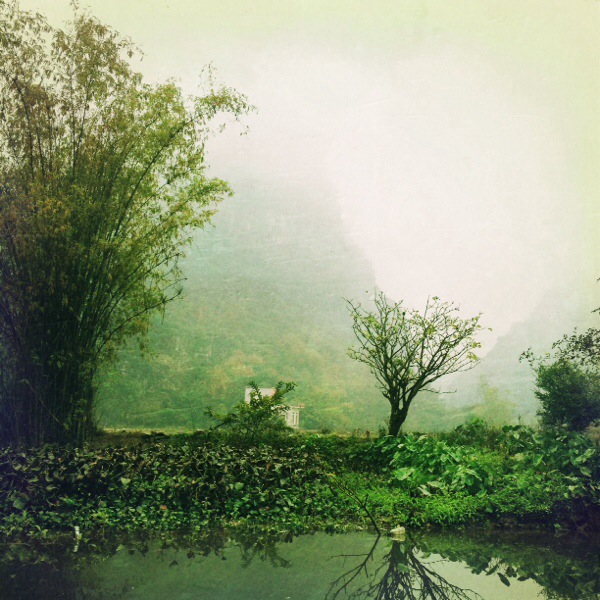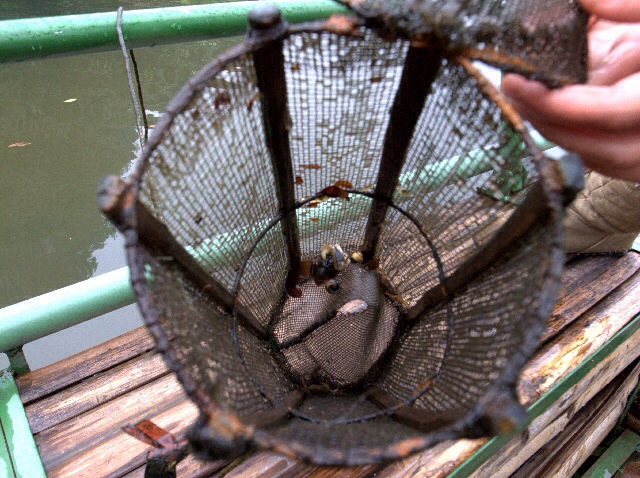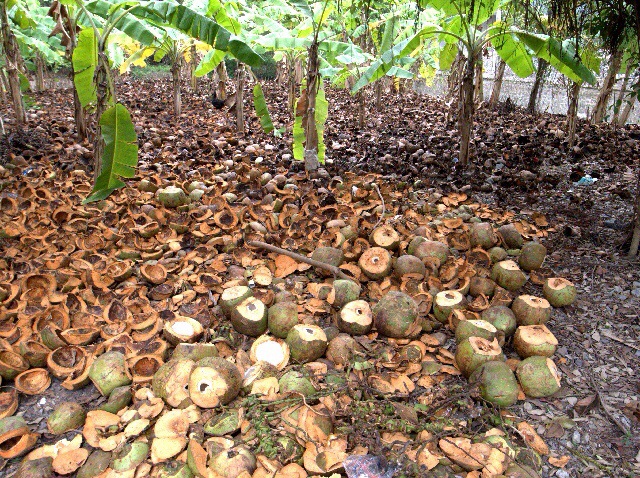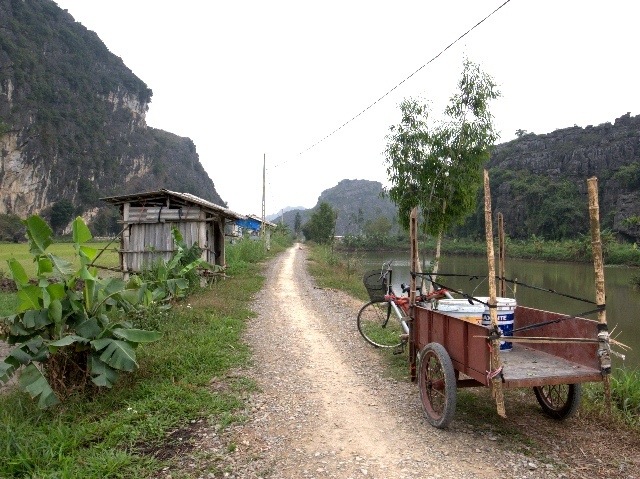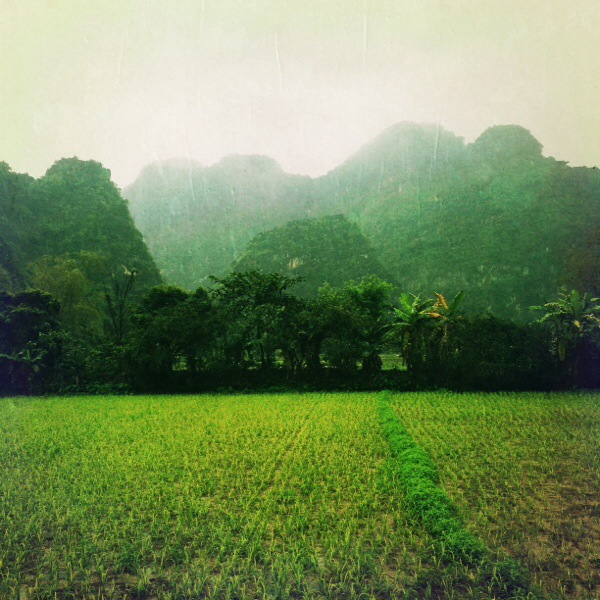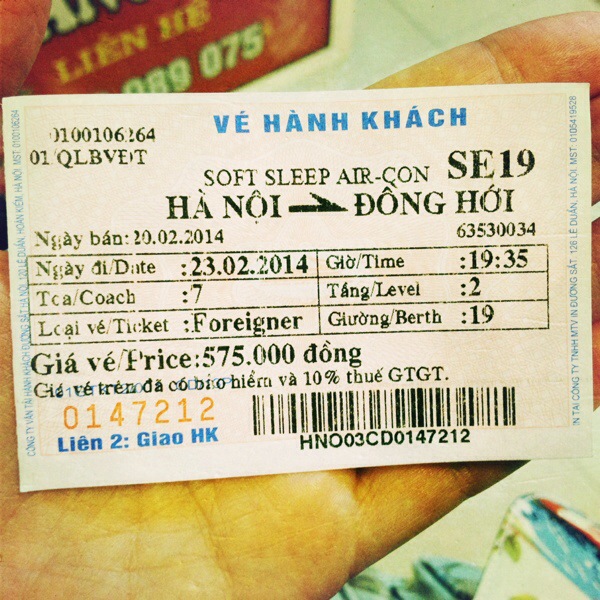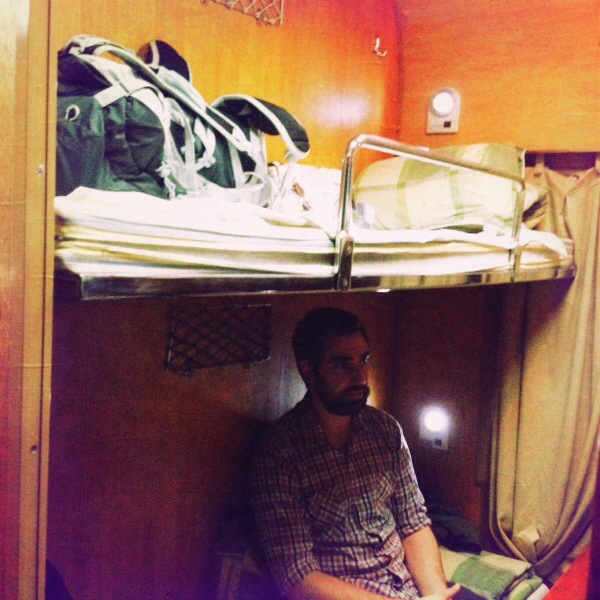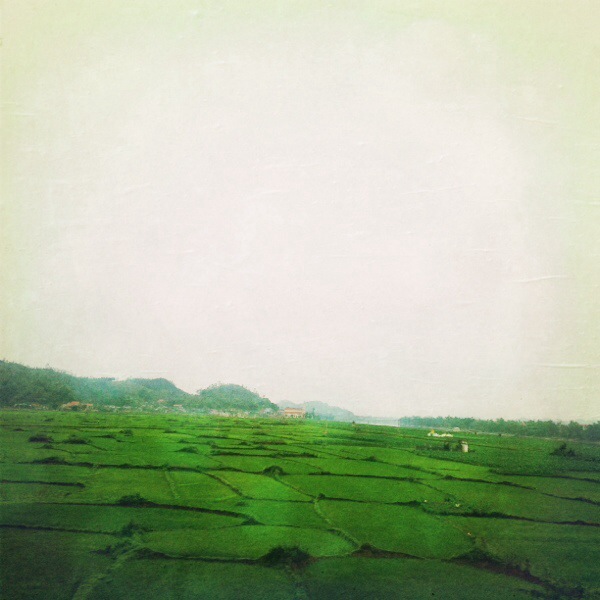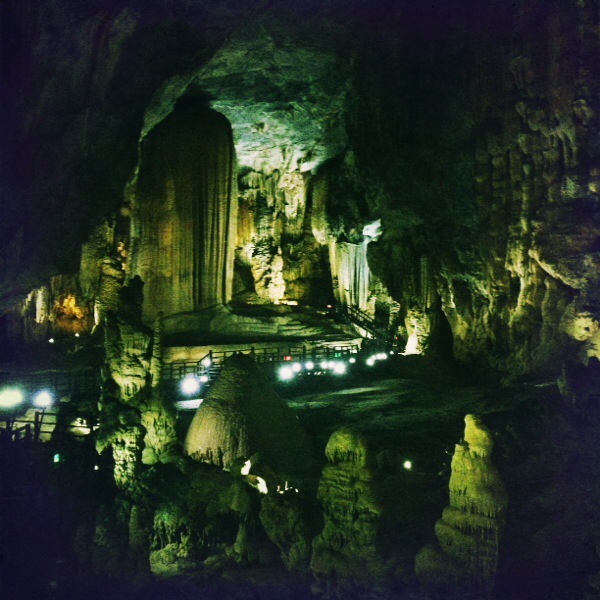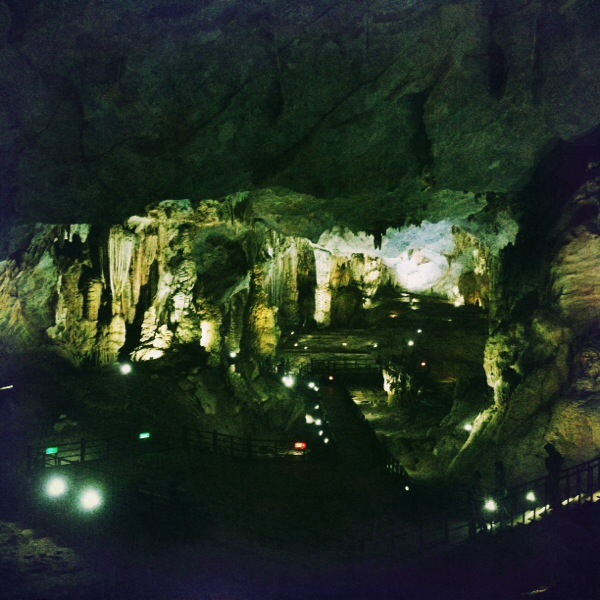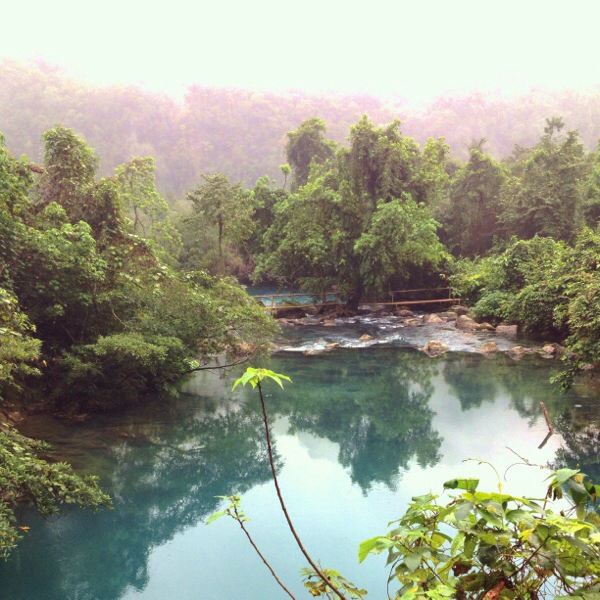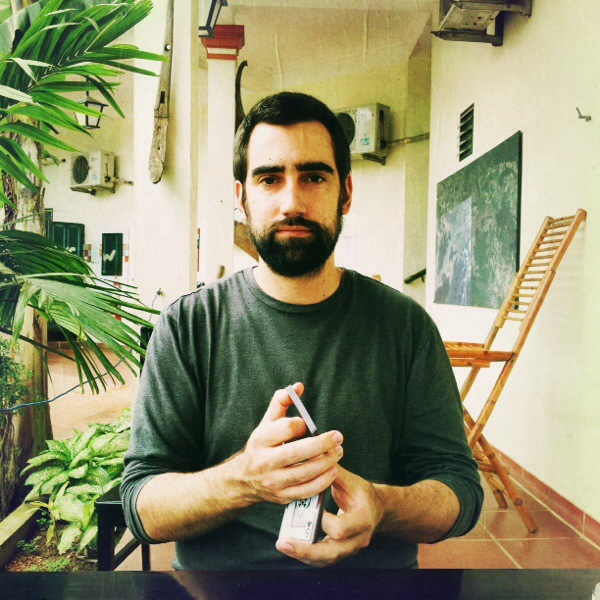We wanted to get out of the city and see more of rural Vietnam so we made a side-trip from Hanoi to Ninh Bình with a guide, Mu, and a local driver, Vuong, to show us around. We drove two hours south and stopped in Vân Long (one of the many places in Vietnam that is referred to as 'Halong Bay on land') where we took a boat trip around some limestone cliffs and through a small cave. We could hear birds and gibbons in the forest, but they stayed hidden as it was a cool drizzly day.
Mu brought us out here to show us a site we might not otherwise see – Vân Long is less popular with westerners (who mostly do trips out to Tam Cốc) but quite popular with Chinese tourists, who come to visit the nearby temple.
Looking up from inside a limestone cave
Rower taking us around
We stopped at a local restaurant for a massive lunch. We read later that in Vietnam you should always leave some food on your plate to show that you are full and satisfied with what your host has provided – perhaps ordering a few extra dishes is the only way to ensure this when eating with westerners! Mu and Vuong joked about serving us dog – which they claimed tasted like goat – another regional delicacy. We passed numerous places advertising thịt chó and thịt mèo (“meat meow”) on the drive.
Next we walked through Thung Nắng village, which is located among some very impressive rock formations. We saw a guy with a cage on his bike actually buying a dog for a wedding banquet, which gave a new meaning to the phrase “Going to see a man about a dog”… Being an animal-lover in Vietnam is hard.
Our next stop was Yên Mô village, where we'd be staying for the night. Mu took us to see a woman making rice noodles – she soaks the grains of rice, runs them through a hand-operated machine and then drains them overnight to sell at market early the next morning. She makes about 100,000 dong per day, which adds up to less than $2000 a year. But that's a pretty decent income in this village, where people grow nearly all their own food.
After that we went to the local market. Brendon had to keep his head low to stay under the tarp that covered the walkways. We received a lot of stares from locals, along with some obligatory “Hello!”s. One man started shouting at us and Mu translated it as “I would like to say a lot of things to you, but I don't know how!”
The next day Mu took us for a walk through the fields of peanuts, rice, cabbage, lettuce and morning glory.
Workers were out tending their crops in the rain among the graves of their ancestors.
We visited Bích Động Pagoda, which is built on a cliff filled with caverns and caves used as hideouts during wars with China and America. We saw some deep chasms covered in nets into which people had thrown money. We asked Mu what it meant and she explained that during the wars there were so many casualties that the dead could not all be buried. Bodies had to be thrown down into the chasms, and people leave money so that these dead soldiers can have a good life in the spirit world.
We stopped in for tea with an older man who works at the pagoda as a guide and musician. He offered Brendon a hit of tobacco from a porcelain jar that acted like a water pipe and showed us some traditional instruments – the Vietnamese cello, the Vietnamese violin and the Vietnamese electric guitar, complete with whammy bar. A large group of drunk guys joined us and took turns singing while the old man played and everyone clapped.
Brendon eating cơm cháy
We took a rowboat around the lake, snacked on cơm cháy chà bông (big puffed rice crackers with pork floss) and chatted to Mu. She's an ethnic Hmong from Sapa, but moved to Hanoi and now works 28 days out of the month. The rest of her family still lives in the remote village she was born in and it sounded like she was the main income earner.
Mu on her phone
She explained how back in her village girls are often married off early through a “kidnapping” tradition whereby during the Tet celebration a boy will kidnap a girl and bring her to live with his family. That night, the girl's family receives a water buffalo horn full of rice whiskey, which they drink if they approve of the proposed marriage or hold off on drinking if they want to give the girl a chance to turn down the offer. A bride price is eventually worked out and, once married, the girl lives with and works for the husband's family.
Mu explained how she artfully dodged all of this by staying home during the New Year celebrations, learning both English and Vietnamese, training to be a guide in her early teens and moving away from home, although she still has some concerns about losing autonomy if she gets married.
It was interesting hearing how she is trying to reconcile her lifestyle with the older generation's ideas and expectations. She tried giving her parents a mobile phone to stay in touch but only her little sister knows how to use it, she has a 90-year-old grandmother who loves to complain about the food, and a father who has health issues but won't stop drinking his rice whiskey – yep, people are people wherever we go.
We saw a few different methods for catching fish and marine life – this was a trap Mu pulled up for us to take a look. There were also guys who used electricity to stun the fish under the weeds then scoop them into the boat.
Roadside coconut debris
Country roads
We jumped ashore in Tràng An village and stopped for lunch at a fisherman's house. Then Mu pulled out three rusty mountain bikes and we set off down some bumpy country roads for a ride in the rain. After about 20 minutes of Katie's granny-style riding, locked gears and seats that fell down, we checked to see if Mu wouldn't mind cutting down the three hours she'd set aside for the ride to maybe an hour and a half. As a shortcut, she took us down the side of a four lane highway. The trick was to not venture too far to the right because it was all slick mud on top of the pavement but at the same time you didn't want to drift too far left into the wild Vietnamese traffic. To add to the fun, we rode past a very popular temple where we had to navigate through crowds of pedestrians shouting “Hello!” and “Tây! Tây! Tây!” Once out of the fray we biked past a few more families parking their vehicles – parents stopped and pointed us out to the children, who gave us wide-eyed stares and waves.
We finally got off the highway and rounded a corner when a group of roadside workers erupted in laughter. Mu said they wanted to know if Brendon would like to take over some shoveling. A lady drove by on a scooter, pointing and shouting. Mu's translation: “Isn't your other leg cold?” Admittedly we may have looked a little ridiculous – we had both rolled up our right pant legs to avoid getting them caught in the gears.
Fisherman's backyard
We biked back to the fisherman's house for a cup of tea before piling back into the car for the ride home.
Once back in Hanoi we celebrated our last night in town with a few glasses of wine and a pizza – so Vietnamese!
The next night we boarded the train to Đồng Hới. We'd booked two bunks in a four-bunk sleeper for a journey of about 11 hours.
When we got to our cabin there were eight people already sitting on the two lower bunks. We looked at each other, confused, until a railway employee walked over and spoke to the people harshly in Vietnamese. Four people moved off Brendon's bed and all eight now squeezed onto the one unclaimed lower bunk. Katie climbed onto the top bunk and Brendon sat below trying to motion to the Vietnamese passengers that it was okay if they wanted to go back to sitting on the edge of his bed.
A minute later the railway guy popped back into the cabin and looked at us, rubbing his fingers together. Uhhh? 'Money!' exclaimed the man. 'Money? How much?' '50,000.' Brendon pulled out his cash and handed it over. The man looked up at Katie and pointed. 'Her too? Ối giời ơi!' The man smacked Brendon in the shoulder while the other passengers giggled. Katie fumbled around for her 50,000. Just then the owners of the other two bunks walked in – the man evicted the eight people from the cabin and the process repeated.
The owners of the other two bunks were Brendan and Tiffany, long-term travellers (and bloggers) from Canada and Switzerland respectively. We chatted for a while then curled up in our comfy bunks and passed out.
We arrived in Đồng Hới at around 7am and got a lift to Phong Nha Farmstay. It's not actually a farm, but it's out in the country and surrounded by rice paddy fields. The farmstay runs a lot of different tours and it's a good base from which to explore the local national parks and cave networks, if you're into that sort of thing.
On Day 3 we did the most popular tour out to Kẻ Bàng National Park. The day started with a walk through Paradise Cave, a large cave equipped with walkways, good lighting, handrails and rubbish bins.
Next we stopped for lunch, put on our swimmers and kayaked across a beautiful blue lake to another cave, where we'd been told we could swim.
This cave was somewhat more rustic than Paradise Cave – the pebbly floor soon turned to mud as our guide Hung led us further and further in. The path became so muddy that you had to hold onto the walls to keep from slipping in the knee-deep muck – unfortunately the walls were also made of mud. Huge boulders had to be clambered over, at great risk to the almost bare arses of all the girls in the group. We were all filthy and sweating profusely by the time we got to a clearing. Was this the swimming hole? No. It was a big puddle of mud. Hung laughed. Some of the younger, more enthusiastic members of the group gleefully threw themselves into the puddle, while the older, crabbier contingent looked at Hung like we were ready to drown him in it.
We turned back the way we had come, sliding down mounds of mud like they were slippery dips. Eventually we turned down a passageway and came out at a big pool of clear water. We waded in and floated around, cooling and cleaning ourselves off. Afterwards we kayaked back, had a few shots of Vietnamese rum and headed back to the farmstay.
That was about enough excitement for us!
Click the sound button to hear a rendition of “In Tall Buildings”
We spent some time chilling with Heidi and Isaac, a couple from Washington State who were playing hostels and guesthouses to cover their accommodation.
The rest of our time at the farmstay was spent unwinding from Hanoi with a little reading, writing and relaxing among the rice paddies.
